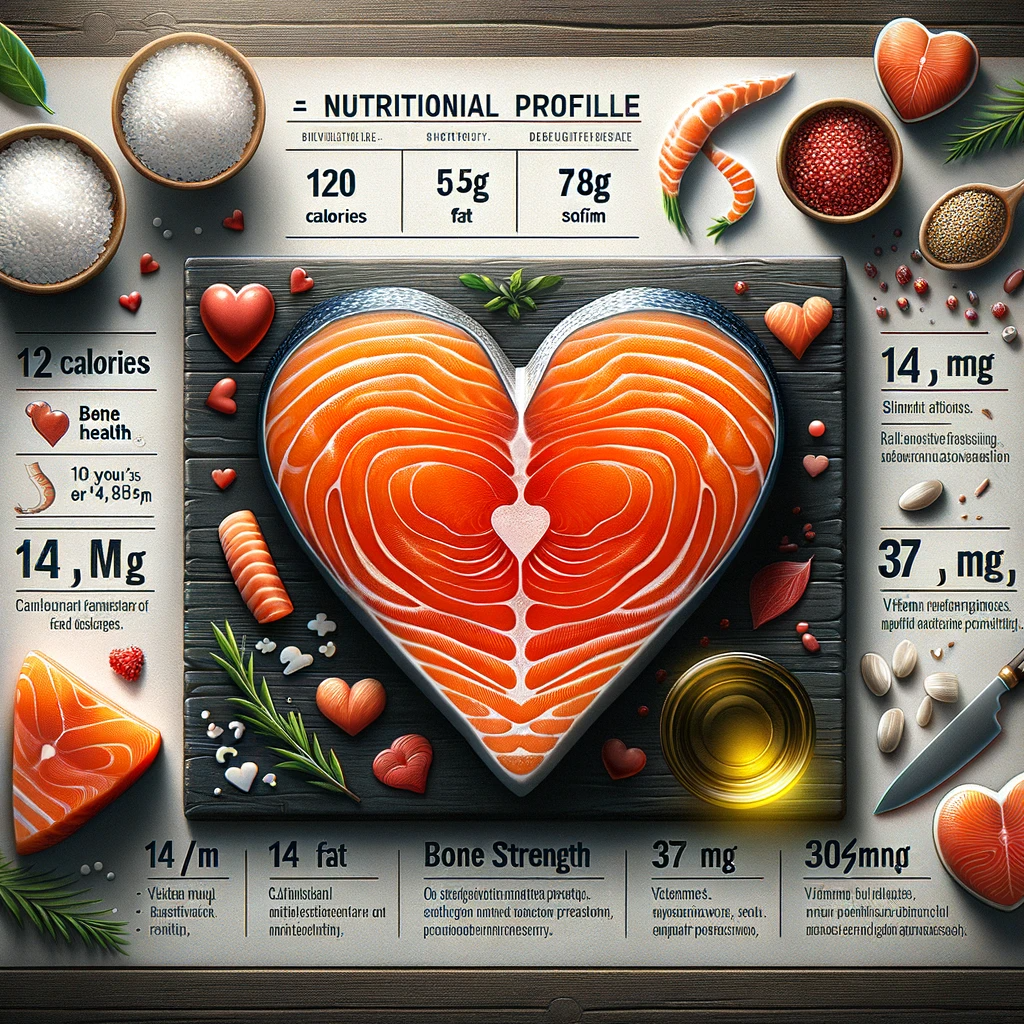Salmon, a nutritious and versatile fish enjoyed worldwide, offers a myriad of powerful health benefits. With its impressive nutritional profile, salmon is a rich source of protein, essential omega-3 fatty acids, vitamins, and minerals.
In this article, we delve into the various advantages associated with consuming salmon. From promoting heart health and strengthening bones to improving mood and supporting fetal development during pregnancy, the benefits are vast.
However, it is crucial to consider potential allergies, adverse effects, and the sourcing and preparation of salmon. Controversies surrounding wild versus farmed salmon and the risks of consuming pollutants like mercury are also discussed.
Additionally, practical advice on buying, storing, and preparing salmon is provided. Whether you’re a seafood enthusiast or seeking to incorporate nutritious options into your diet, understanding the health benefits and considerations of salmon is essential.
Nutritional Profile of Salmon
The nutritional profile of salmon is impressive, making it an excellent choice for those seeking a well-rounded source of essential nutrients. A 3-ounce serving of salmon provides 121 calories, 17g of protein, 5.4g of fat, and 37.4mg of sodium. It is naturally free of carbohydrates, including fiber and sugar.
Salmon is also a great source of high-quality complete protein, providing all essential amino acids. Moreover, it is rich in vitamins A and D, multiple B vitamins, and minerals such as magnesium, potassium, phosphorus, zinc, and selenium.
This nutrient-dense fish is known to support heart health, reduce the risk of osteoporosis, boost mood, promote a healthy pregnancy, and may even help prevent Alzheimer’s disease. With its impressive nutritional content, salmon is a valuable addition to a healthy diet.
Heart-Healthy Benefits of Salmon
Salmon is known to be a heart-healthy food due to its ability to reduce the risk of cardiovascular conditions and lower blood pressure. One of the key reasons why salmon is beneficial for heart health is its high content of omega-3 fatty acids. These fatty acids have been shown to reduce inflammation, decrease triglyceride levels, lower blood pressure, and improve overall heart function.
Additionally, salmon is a rich source of vitamins and minerals that support heart health, such as vitamin D, vitamin B12, potassium, and selenium. Incorporating salmon into your diet on a regular basis can provide these heart-healthy benefits and contribute to a well-rounded and nutritious eating plan.
Salmon’s Impact on Bone Health
When considering bone health, it is important to highlight the impact that salmon can have on maintaining strong and healthy bones. Here are three key points to evoke emotion in the audience:
-
Salmon is a rich source of calcium, a vital mineral for bone health. Calcium is essential for maintaining strong bones and preventing conditions like osteoporosis.
-
Salmon is also high in vitamin D, which plays a crucial role in calcium absorption. Vitamin D deficiency is linked to weakened bones and increased risk of fractures.
-
The omega-3 fatty acids found in salmon have anti-inflammatory properties that can help reduce the risk of bone loss and promote overall bone health.
Incorporating salmon into your diet can provide these important nutrients and contribute to maintaining optimal bone health.
The Mood-Boosting Benefits of Salmon
Incorporating salmon into your diet can have a positive impact on mood and mental well-being. Salmon is rich in omega-3 fatty acids, specifically EPA (eicosapentaenoic acid) and DHA (docosahexaenoic acid), which have been shown to have mood-boosting effects. These fatty acids play a crucial role in the development and function of the brain and are associated with a reduced risk of depression and improved cognitive function.
Additionally, salmon is a good source of vitamin D, which has been linked to improved mood and reduced symptoms of depression. The combination of omega-3 fatty acids and vitamin D in salmon makes it a valuable food for supporting optimal mental health.
Salmon’s Role in Supporting Pregnancy and Brain Health
During pregnancy, the consumption of salmon can play a vital role in supporting fetal brain and nervous system development. Here are three key reasons why including salmon in your diet is beneficial during pregnancy:
-
Omega-3 fatty acids: Salmon is an excellent source of omega-3 fatty acids, specifically DHA (docosahexaenoic acid), which is crucial for brain development in the fetus. DHA helps build the brain and nervous system, and studies have shown that higher maternal intake of omega-3s is associated with improved cognitive function in children.
-
Protein and nutrients: Salmon is a rich source of high-quality protein and essential nutrients like vitamins D and B12, iodine, and selenium. These nutrients are important for the overall development of the baby, including the formation of the brain and nervous system.
-
Mood regulation: Pregnancy can bring about hormonal changes and mood swings. The omega-3 fatty acids found in salmon have been shown to have mood-regulating effects and may help reduce the risk of postpartum depression.
Including salmon in your diet during pregnancy can provide important nutrients and support the healthy development of your baby’s brain and nervous system.
Frequently Asked Questions
How Often Should I Consume Salmon to Reap Its Health Benefits?
To reap the health benefits of salmon, it is recommended to consume it about twice per week.
Salmon is a nutritionally dense food, rich in protein, omega-3 fatty acids, vitamins, and minerals.
Regular consumption of salmon can support heart health, reduce the risk of osteoporosis, boost mood, promote a healthy pregnancy, and may help prevent Alzheimer’s disease.
However, it is important to choose wild-caught salmon and consume it in moderation, as chronic consumption of mercury and pollutants may have adverse effects.
Is It Safe to Consume Raw Salmon, Such as in Sushi or Sashimi?
Consuming raw salmon, such as in sushi or sashimi, poses a risk of foodborne illness. Pregnant individuals and those with compromised immune systems should exercise caution when consuming raw salmon.
It is recommended to choose reputable restaurants that follow proper food safety practices when consuming raw seafood. Additionally, it is important to note that farmed salmon may contain persistent organic pollutants and heavy metals.
Individuals with fish allergies should avoid consuming raw salmon.
Are There Any Risks or Considerations Associated With Eating Farmed Salmon?
There are several risks and considerations associated with eating farmed salmon.
Farmed salmon may contain persistent organic pollutants and heavy metals, which can be harmful to human health.
Additionally, there is controversy regarding the use of antibiotics and synthetic dyes in farmed salmon.
It is important to choose reputable sources and look for certifications such as the Aquaculture Stewardship Council (ASC) or the Global Aquaculture Alliance’s Best Aquaculture Practices (BAP) when purchasing farmed salmon.
Consuming wild-caught salmon is generally considered a safer and more sustainable option.
Can Salmon Consumption Help With Weight Loss or Weight Management?
Salmon consumption can be beneficial for weight loss or weight management due to its high protein content and omega-3 fatty acids.
Protein is known to increase satiety and reduce appetite, helping to control calorie intake.
The omega-3 fatty acids in salmon have been shown to promote fat burning and improve insulin sensitivity, potentially aiding in weight loss.
However, it is important to incorporate salmon into a balanced diet and maintain a calorie deficit for effective weight management.
Are There Any Specific Cooking Methods or Recipes That Are Recommended for Maximizing the Health Benefits of Salmon?
To maximize the health benefits of salmon, it is recommended to opt for cooking methods that retain the nutrients and omega-3 fatty acids. Baking, grilling, or steaming are considered healthier options compared to frying. These methods preserve the natural flavors and textures of the fish while minimizing the use of additional oils or fats.
To enhance the taste, consider adding herbs, spices, or a squeeze of lemon. Overall, the key is to cook salmon in a way that preserves its nutritional value and supports a healthy diet.

